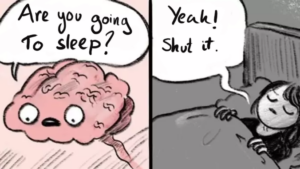Your Brain Has a Mind of Its Own
Our brain operates autonomously, and we are only aware of a small percentage of its activity.
If you’ve ever tried to sit quietly and clear your mind, it’s likely that you didn’t succeed—or if you did, it wasn’t for more than a few seconds.
Our brain constantly throws thoughts, images, or memories at us, automatically.
It’s very common to experience what are known as intrusive thoughts. These thoughts appear out of nowhere and, sometimes, their content can be completely opposite to who we are or what we would ever do.
You might be standing near train tracks and your brain says, “What if you jump?” Or talking to your father-in-law in the kitchen, and you imagine stabbing him with a knife. Or maybe you see someone on the street and suddenly imagine having sex with them.
One research study found that 94% of participants experienced at least one such thought over a three-month period.
Obviously, you would never act on these thoughts (well, maybe the last one), but your brain doesn’t care. It just hands you the image or idea for free.
Why?
Why does my brain think things I don’t want to think?
For the same reason it thinks about things you don’t care about. Your brain contains billions of neural connections that are mostly activated chaotically. Some of these connections surface in your consciousness as intrusive thoughts.
The issue is that if I’m normally worried about whether I’m a good person, a pervert, or if I’m going crazy, when an intrusive thought comes up that aligns with those fears, it will trigger my alarms.
If none of those worries were on my mind or part of how I see myself, the intrusive thought would likely pass unnoticed as just a fleeting “mental fart”.
If the thought distresses me, I might try to suppress it, make it disappear, or avoid having it again. Unfortunately, multiple studies show that trying to suppress certain thoughts usually has the opposite effect, making them appear more frequently. Our brain is paradoxical and can be quite uncooperative.
How do I know if my intrusive thoughts are a problem?
Intrusive thoughts, in and of themselves, are not a problem. Thoughts are ultimately just thoughts.
Problems related to intrusive thoughts often arise because of how we react to them.
If we react by rigidly, insistently, and anxiously trying to avoid, suppress, or push these thoughts away, we can create a problem.
Since we cannot control intrusive thoughts and trying to do so usually backfires, we might feel stuck. As we perceive this as a problem we can’t control or “fix,” we might feel increasingly trapped and overwhelmed by these thoughts, fueling our anxiety and amplifying the problem.
It’s normal to feel alarmed and want to engage in control or avoidance behaviors when these thoughts touch on our fears and insecurities.
However, it’s important to recognize that these responses are problematic and unlikely to help—in fact, they will probably make things worse.
What should I do when I have intrusive thoughts?
As with many things in psychology, the key is acceptance.
Accepting that the thought exists means acknowledging its presence without feeling the need to suppress, avoid, or control it.
It may be unpleasant, and we might wish it hadn’t appeared, but we don’t need to compulsively suppress it or assume we’re crazy, dangerous, or that something is seriously wrong with us. This thoughts are a normal and common occurrence.
Observing the thought without judgment, without trying to control it, and without expecting it to disappear immediately is the best way to deal with it. When we learn that having these thoughts doesn’t mean anything significant and doesn’t pose a danger, our reaction to them will become calmer, and our alarms won’t go off.
When we’re unbothered, we stop worrying about whether they appear or not, and over time, they will likely show up less and less. Even if they do reappear, we won’t mind—and it won’t be a problem.
This approach may sound counterintuitive because we naturally want to “fix” anything we perceive as a problem.
But intrusive thoughts are not a problem—they are a normal phenomenon experienced by most people.
They only become a problem when we fight against them, try to control them, or worry that they define us.
Conclusion
Having unpleasant, bizarre, or otherwise intrusive thoughts is normal.
Experiencing intrusive thoughts about things you’d never do or that deeply shock you happens to most people. It’s not a problem.
Problems arise when we react by trying to suppress, control, or avoid such thoughts, which can create a rebound effect and make them more frequent. This might leave us feeling helpless and unable to escape, further amplifying our distress.
The solution lies in understanding that thoughts are normal—just thoughts, no matter how unpleasant. By accepting their presence without adding layers of judgment like, “Something is seriously wrong with me,” or “I must be crazy,” we avoid falling into a trap of struggling against them.
Practicing mindfulness can be a helpful way to approach these thoughts and ensure they don’t become a problem.
If you’d like to gain a deeper understanding of your relationship with these thoughts and develop effective skills to manage them, consider reaching out to us to begin psychotherapy, as many others have successfully done.







